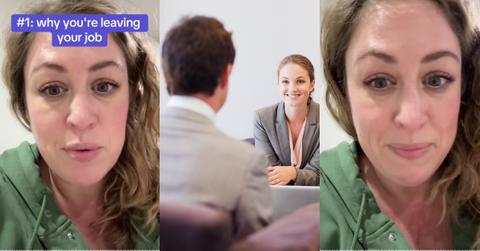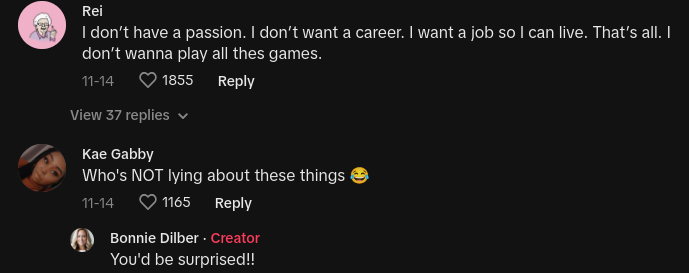"Sometimes It's Essential to Lie" — Recruiter Lists Things You Should Always Lie About in a Job Interview
Published Nov. 27 2023, 10:43 a.m. ET

Job recruiter Bonnie Dilber (@bonniedilber) posts a variety of different tips and tricks for job seekers looking for any edge they can get for securing gainful employment. Recently, she went viral on TikTok for uploading a clip that some people would think is stating the obvious: that keeping it real in a job interview is probably not the best idea.
Sure, there are throngs of folks on social media who will post viral rants about job interviewers expecting too much of applicants, stating that the only reason they'd ever want a job is to just get paid because they'd much rather be investing their time and energy into exploring their hobbies and having fun instead.
Bonnie argues that recruiters aren't "dumb," and that they know the primary reason applicants are leaving a current position and seeking a new one out is more than likely because it pays more and offers better benefits, but that if job seekers aren't smart enough to create more compelling reasons and paint a picture of what life would look like if they were actually interested in doing good work that they don't come off as a healthy candidate for the gig.
Her suggestion is that folks should ultimately lie in their job interviews, and gave three specific instances where fibbing is going to do a lot more for your ability to actually land the job than being entirely honest with the recruiter.
"There are three things that I need you to lie about in every interview. Save these and prepare your lies before every interview. Number one, if you are leaving your job because you really dislike it because you don't get along with your boss or your colleagues, you're gonna lie about this," Bonnie says at the top of her video.
Her first word of advice is to avoid bad-mouthing management or co-workers at your current place of employment if you're leaving your current role to pursue another: "Please do not tell them that your boss doesn't like you don't tell them that everyone's really hard to work with. All they are gonna hear when you say that is that you are difficult. Instead, you're gonna say something like things are going great but I want to take on bigger challenges."

Bonnie then goes on to say that lying about your reason for wanting the job is probably a good idea and that you're going to come off as a tone-deaf and clueless fool if the first thing you come up with is the benefits and salary being offered.
"The second thing that you're gonna lie about is why you want the job. I mean look y'all 100% of people who want a job want it for the money and benefits. That's not a unique answer, it doesn't actually differentiate you from anyone. And it's a big red flag to them because they think that's all you care about if that's the only thing you can come up with."

She says that painting a picture as to why you're a good candidate for the business and it's because you align with the company's goals, is the main reason why you're applying to this position: "Instead you are gonna tell them why you're passionate about the company's mission, why this job is your life's work and you are just such a good fit for the culture at this company."
Another common question she says that folks should probably lie about when asked it in an interview is about your long-term goals/plans. Under any and all circumstances those plans, Bonnie says, should include the company that you're applying to work for.
"And the third one y'all is your plans for the future. I don't care if you are starting grad school in six months, and just need this job as filler. I don't care if this job pays half of what you're used to making and you are gonna jump ship as soon as you find something better. When they ask you about your plans for the next five years, your plans are to be at that company."

She continued, "Your plans are to come in, knock it out of the park in this role and continue to grow as opportunities arise. What every company wants is top talent...that is going to stay and grow with them. And if you come into an interview and communicate current job's not going well, you're just really in it for the money, and you don't really plan on staying long term, you are none of those things."
"Y'all recruiters are not dumb we know that if everything was awesome at your current job you wouldn't be leaving. We know that you are in it for the money and the benefits. We know that you will leave if there is better money and better benefits somewhere else."

"But those are universal things, so if you can't differentiate yourself from a crowd, if you can't come up with anything better, then those really basic things, if you don't have the critical thinking to know that those aren't going to be very attractive to an employer then it's gonna be hard for a recruiter to move you forward in their process."
Numerous commenters who responded to Bonnie's video stated that while they were upset about the "manipulation" they had to partake in in job interviews, there were also several others who felt like her suggestions were "common sense" and couldn't believe that there may be job seekers out there who don't know how to massage the truth or straight up lie in their job interviews.

What do you think? Have you had a difficult time telling fibs under pressure when in a job interview? Or are you so focused on getting the job that you can become a used car salesman at the drop of a hat?